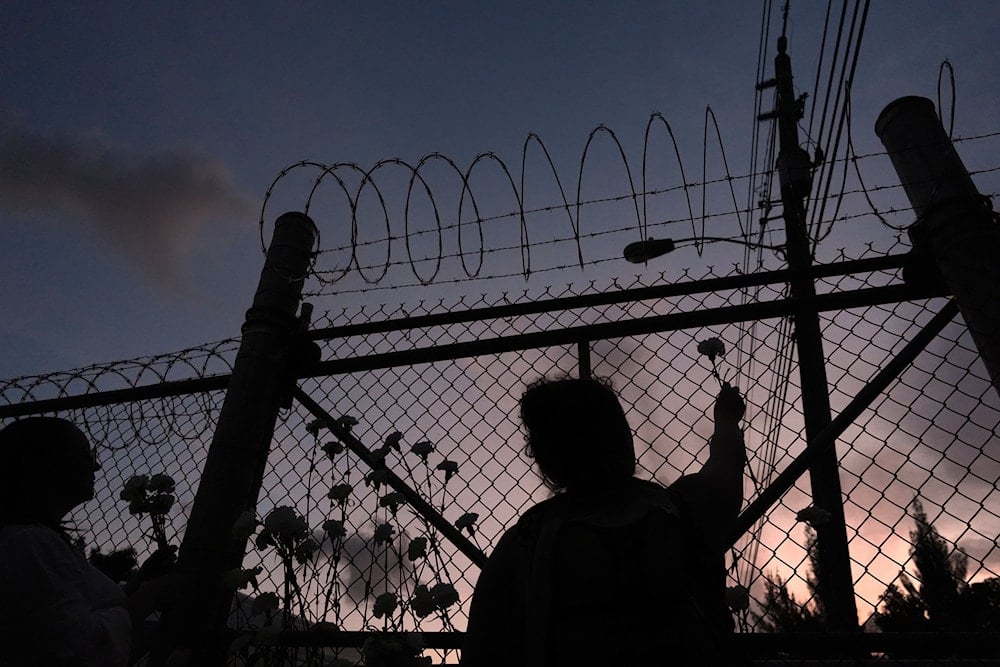US 'genetic surveillance': Children targeted, DNA sent to FBI
US immigration authorities have added over 1.5 million DNA profiles, including those of migrant children, to the FBI's CODIS database.
-

People place flowers on a fence outside Krome Detention Center in Miami on May 24, 2025 (AP)
US immigration authorities are collecting and uploading the DNA information of migrants, including children, to a national criminal database, according to newly released government documents.
According to The Guardian on Saturday, the documents, published by Customs and Border Protection (CBP), reveal that the agency has been gathering DNA from individuals in its custody, many of whom have not been accused of any felony offense.
The data are being submitted to the FBI’s Combined DNA Index System (CODIS), a national database used by federal, state, and local law enforcement to identify suspects through genetic material. According to experts, cited by The Guardian, this practice represents a sweeping and unprecedented expansion of genetic surveillance.
'Genetic surveillance'
"This is a massive expansion of genetic surveillance and an unjustified invasion of privacy," said Emerald Tse, a researcher at Georgetown University’s Center on Privacy and Technology.
The DNA collected by CBP is being stored indefinitely by the FBI in CODIS. According to the agency, samples are taken from individuals who are arrested on federal charges or detained under CBP’s authority and subject to fingerprinting.
Additionally, CBP’s assistant commissioner of public affairs, Hilton Beckham, justified the policy by citing "national security" concerns.
“We are not letting human smugglers, child sex traffickers, and other criminals enter American communities,” Beckham told Wired, which first reported the story.
However, the documents indicate that many individuals whose DNA has been collected were not charged with any crime, and Georgetown researchers noted that the policy appears to target nearly every migrant detained, regardless of the circumstances.
Read next: Thousands of federal agents reassigned to immigration: Reuters
Children as young as four included in surveillance program
More than 133,000 migrant children and teens have had their DNA collected and added to the database since 2020. Of those, nearly 230 were children under 13 and over 30,000 were between the ages of 14 and 17.
CBP policy states that DNA collection generally applies to individuals aged 14 to 79, but field officers have discretion, especially under the Department of Justice's 2020 directive, which mandated DNA collection from detained non-US citizens.
A recent report from Georgetown University and the Center on Privacy and Technology highlights that CBP has uploaded more than 1.5 million DNA profiles to CODIS since 2020, an increase of 5,000% in just three years.
Read next: FBI's DNA database expanding at a record pace: The Intercept
Policing practices reinforced
Tse said, "The program reinforces harmful narratives about immigrants and intensifies existing policing practices that target immigrant communities and communities of color," adding that the report stresses that this level of data collection would not have been legally permissible in a traditional criminal context due to stricter safeguards.
While state and local law enforcement face legal constraints when collecting DNA from criminal suspects, the immigration system imposes fewer restrictions. In this context, merely being "detained" can trigger DNA collection, even though the term is loosely defined and inconsistently applied.
The CBP documents include detailed personal information such as age, country of origin, transfer destinations, and the basis for detention.
Privacy advocates raise alarm
Moreover, the indefinite storage of DNA profiles, particularly of minors and individuals not charged with any crime, raises serious ethical and privacy concerns.
Quoting internal CBP documentation, the Georgetown report asks, "How would it change your behavior to know that the government had a drop of your blood, or saliva, containing your entire genetic code, which will be kept indefinitely in a government-controlled refrigerator in a warehouse in Northern Virginia?"
According to the report, privacy advocates warned that such mass surveillance undermines civil liberties, particularly for immigrant and minority communities, and could deter individuals from seeking healthcare, protesting, or simply existing freely in society.

 4 Min Read
4 Min Read









